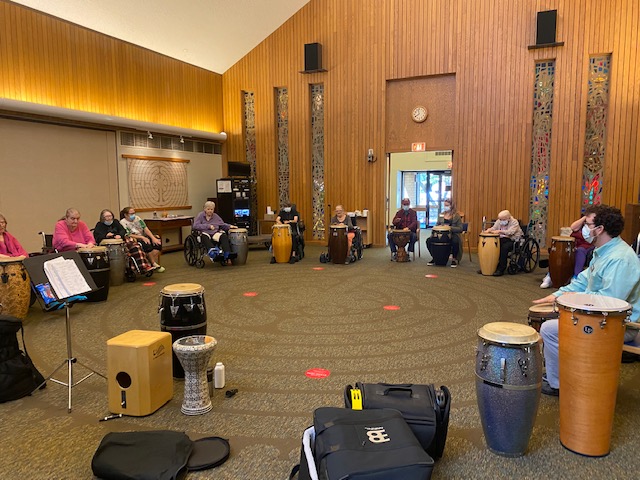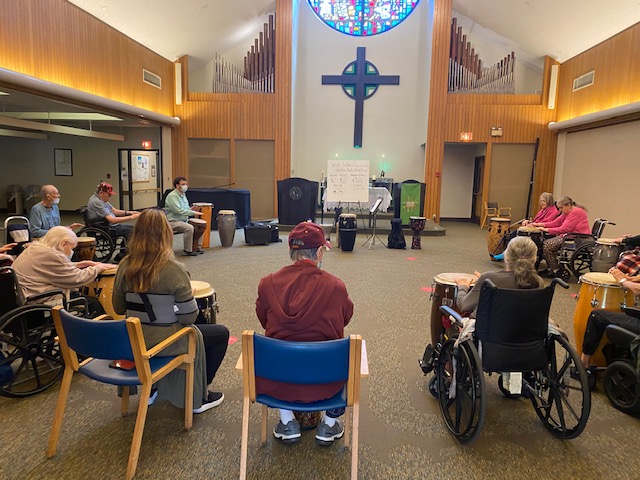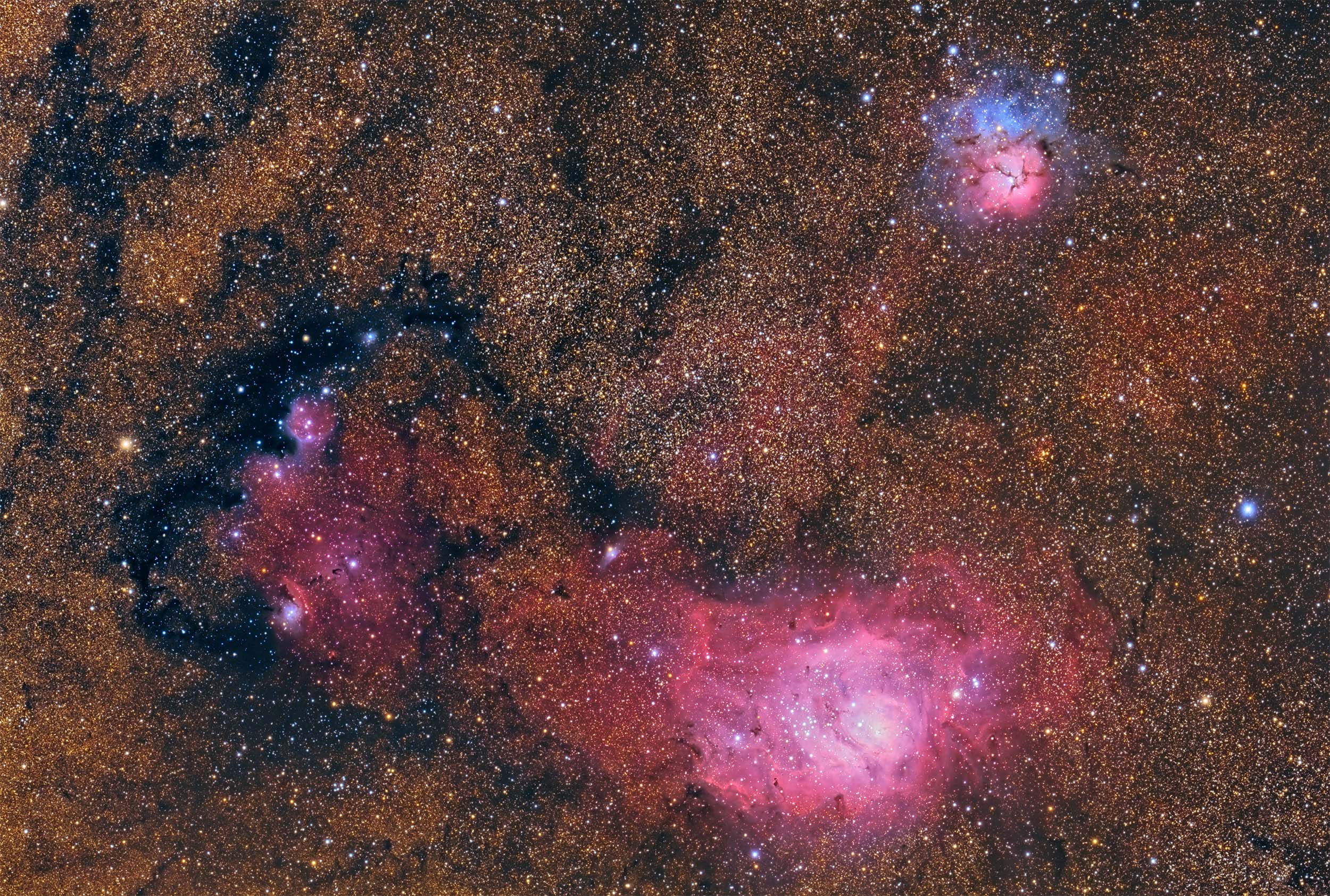Blog
Conrad Yeatis “Sonny” Clark (July 21, 1931 – January 13, 1963) was an American jazz pianist and composer who mainly worked in the hard bopidiom.
Clark was born and raised in Herminie, Pennsylvania, a coal mining town east of Pittsburgh. His parents were originally from Stone Mountain, Georgia. His miner father, Emery Clark, died of a lung disease two weeks after Sonny was born. Sonny was the youngest of eight children. At age 12, he moved to Pittsburgh. Clark died in New York City on January 13, 1963 (aged 31). The official cause was listed as a heart attack, but the likely cause was a heroin overdose.
https://www.youtube.com/watch?v=Q3HgxCUUiiE
more...

These three bright nebulae are often featured on telescopic tours of the constellation Sagittarius and the crowded starfields of the central Milky Way. In fact, 18th century cosmic tourist Charles Messier cataloged two of them; M8, the large nebula above and left of center, and colorful M20 near the bottom of the frame. The third emission region includes NGC 6559, right of M8 and separated from the larger nebula by a dark dust lane. All three are stellar nurseries about five thousand light-years or so distant. Over a hundred light-years across the expansive M8 is also known as the Lagoon Nebula. M20’s popular moniker is the Trifid. Glowing hydrogen gas creates the dominant red color of the emission nebulae. In striking contrast, blue hues in the Trifid are due to dust reflected starlight. The colorful composite skyscape was recorded with two different telescopes to capture a widefield image of the area and individual close-ups at higher resolution.

Carlos Augusto Santana Alves born July 20, 1947) is a Mexican guitarist who rose to fame in the late 1960s and early 1970s with his band Santana, which pioneered a fusion of Rock and roll and Latin American jazz. Its sound featured his melodic, blues-based lines set against Latin American and African rhythms played on percussion instruments not generally heard in rock, such as timbales and congas. He experienced a resurgence of popularity and critical acclaim in the late 1990s. In 2015, Rolling Stone magazine listed him at No. 20 on their list of the 100 greatest guitarists. He has won 10 Grammy Awards and three Latin Grammy Awards, and was inducted along with his namesake band into the Rock and Roll Hall of Fame in 1998.
Santana was born in Autlán de Navarro in Jalisco, Mexico on July 20, 1947. He learned to play the violin at age five and the guitar at age eight, under the tutelage of his father, who was a mariachi musician. His younger brother, Jorge, also became a professional guitarist. Santana was heavily influenced by Ritchie Valens at a time when there were very few Mexicans in American rock music. The family moved from Autlán to Tijuana, on the border with the U.S. They then moved to San Francisco, California, where his father had steady work. In October 1966, Santana started the Santana Blues Band. By 1968, the band had begun to incorporate different types of influences into their electric blues. Santana later said, “If I would go to some cat’s room, he’d be listening to Sly [Stone] and Jimi Hendrix; another guy to the Stonesand the Beatles. Another guy’d be listening to Tito Puente and Mongo Santamaría. Another guy’d be listening to Miles [Davis] and [John] Coltrane… to me, it was like being at a university.”
Around the age of eight, Santana “fell under the influence” of blues performers like B.B. King, Javier Bátiz, Mike Bloomfield, and John Lee Hooker. Gábor Szabó‘s mid-1960s jazz guitar work also strongly influenced Santana’s playing. Indeed, Szabó’s composition “Gypsy Queen” was used as the second part of Santana’s 1970 treatment of Peter Green‘s composition “Black Magic Woman“, almost down to identical guitar licks. Santana’s 2012 instrumental album Shape Shifter includes a song called “Mr. Szabo”, played in tribute in the style of Szabó. Santana also credits Hendrix, Bloomfield, Hank Marvin, and Peter Green as important influences; he considered Bloomfield a direct mentor, writing of a key meeting with Bloomfield in San Francisco in the foreword he wrote to a 2000 biography of Bloomfield, Michael Bloomfield: If You Love These Blues – An Oral History. Between the ages of 10 and 12, he was sexually abused by an American man who brought him across the border.[11] Santana lived in the Mission District, graduated from James Lick Middle School, and left Mission High School in 1965. He was accepted at California State University, Northridge and Humboldt State University, but chose not to attend college.
more...Tony Oladipo Allen (20 July 1940 – 30 April 2020) was a Nigerian drummer, composer, and songwriter who lived and worked in Paris, France. Allen was the drummer and musical director of Fela Kuti‘s band Africa ’70 from 1968 to 1979, and was one of the founders of the Afrobeat genre. Fela once stated that “without Tony Allen, there would be no Afrobeat”. He was described by Brian Eno as “perhaps the greatest drummer who has ever lived”.
Later in life, Allen collaborated with Damon Albarn on several projects, including Gorillaz, the Good, the Bad & the Queen and Rocket Juice & the Moon. Allen’s career and life were documented in his 2013 autobiography Tony Allen: Master Drummer of Afrobeat, co-written with Michael E. Veal, who previously wrote a comprehensive biography of Fela Kuti.
Allen was born in Lagos, Nigeria to James Alabi Allen, a motor mechanic from British Nigeria (now present day Nigeria) and Prudentia Mettle, from the Gold Coast(now present day Ghana), He began playing drums at the age of 18, while working as an engineer for a radio station. Allen was influenced by music his father listened to: Jùjú, a popular Yoruba music from the 1940s, but also American jazz, and the growing highlife scene in Nigeria and Ghana. Allen worked hard to develop a unique voice on the drums, feverishly studying LPs and magazine articles by Max Roach and Art Blakey, but also revolutionary Ghanaian drummer Guy Warren(later known as Kofi Ghanaba – who developed a highly sought-after sound that mixed tribal Ghanaian drumming with bop – working with Dizzy Gillespie, Charlie Parker, Thelonious Monk, and Max Roach).
more...Charles Lacy Tyler (July 20, 1941 – June 27, 1992) was an American jazz saxophonist. He focused on baritone & alto saxophone and also played clarinet.
Tyler was born in Cadiz, Kentucky, United States, and spent his childhood years in Indianapolis. He played piano as a child and clarinet at the age of seven, before switching to alto saxophone in his early teens, and finally baritone saxophone. During the summers, he visited Chicago, Illinois, New York City and Cleveland, Ohio, where he met the young tenor saxophonist Albert Ayler at age 14. After serving in the army from 1957–1959, Tyler relocated to Cleveland in 1960 and began playing with Ayler, commuting between New York and Cleveland. During that period played with Ornette Coleman and Sunny Murray.
In 1965, Tyler recorded Bells and Spirits Rejoice with Ayler’s group. He recorded his first album as leader the following year for ESP-Disk. He returned to Indianapolis to study with David Baker at Indiana University between 1967 and 1968, recording a second album for ESP, Eastern Man Alone. In 1968, he transferred to the University of California, Berkeley to study and teach. In Los Angeles, he worked with Arthur Blythe, Bobby Bradford, and David Murray.
more...Ernest Brooks Wilkins Jr. (July 20, 1922 – June 5, 1999) was an American jazz saxophonist, conductor and arranger who spent several years with Count Basie. He also wrote for Tommy Dorsey, Harry James, and Dizzy Gillespie. He was musical director for albums by Cannonball Adderley, Dinah Washington, Oscar Peterson, and Buddy Rich.
Wilkins was born in St. Louis, Missouri. In his early career he played in a military band, before joining Earl Hines‘s last big band. He worked with Count Basie from 1951 to 1955, eventually leaving to work free-lance as a jazz arranger and songwriter. His success declined in the 1960s, but revived after work with Clark Terry, leading to a tour of Europe.
more...Rare are the spiral galaxies that we see exactly from the front. The spiral galaxy NGC6946 located in the constellation Cepheus is about 10 million light-years away.
She hides behind the curtain of stars formed by the Milky Way which crosses the constellation of Cepheus. Its orange central bulb is made up of old stars while the blue
young star clusters dominate in the spiral arms. Red reveals the presence of areas where stars are born.
The activity is so inetnse that one calls this galaxy, the galaxy of the fireworks.

Commander Cody and His Lost Planet Airmen were an American country rock band founded in 1967. The group’s leader and co-founder was pianist and vocalist George Frayne IV, alias Commander Cody (born July 19, 1944 in Boise, Idaho, died September 26, 2021 in Saratoga Springs, New York)
The band’s style mixed country, rock and roll, Western swing, rockabilly, and jump blues together on a foundation of boogie-woogie piano. They were among the first country rock bands to take their cues less from folk rock and bluegrass and more from the rowdy barroom country of the Ernest Tubband Ray Price style. The band became known for marathon live shows.
Alongside Frayne, the classic lineup was Billy C. Farlow (b. Decatur, Alabama) on vocals and harmonica; John Tichy (b. St. Louis, Missouri) on guitar and vocals; Bill Kirchen (Kirchen was born in Bridgeport, Connecticut, June 29, 1948 but grew up in Ann Arbor, Michigan) on lead guitar; Andy Stein(b. August 31, 1948 in New York City) on saxophone and fiddle; “Buffalo” Bruce Barlow (b. December 3, 1948 in Oxnard, California) on bass guitar; Lance Dickerson (b. October 15, 1948 in Livonia, Michigan, died November 10, 2003, in Fairfax, California) on drums; and Steve “The West Virginia Creeper” Davis (b. July 18, 1946 in Charleston, West Virginia), followed by Bobby Black, on pedal steel guitar.
more...Philip Upchurch (born July 19, 1941) is an American jazz and blues guitarist.
Upchurch started his career working with the Kool Gents, the Dells, and the Spaniels, before going on to work with Curtis Mayfield, Otis Rush, and Jimmy Reed. (His association with Kool Gents member Dee Clark would continue, including playing guitar on Clark’s 1961 solo hit “Raindrops“.) He then returned to Chicago to play and record with Woody Herman, Stan Getz, Groove Holmes, B.B. King, and Dizzy Gillespie.
more...Carmell Jones (July 19, 1936 – November 7, 1996) was an American jazz trumpet player.
Jones was born in Kansas City, Kansas, United States. He started piano lessons at age five, and trumpet lessons at age seven. His first professional work was with Kansas City musicians Nathan Davis, Cleanhead Vinson and Frank Smith. He moved to California in 1961, and worked as a studio musician for several years, including in the orchestras for two movie soundtracks, Seven Days In May and The Manchurian Candidate, the latter starring Frank Sinatra. He released two albums as a leader for Pacific Jazzat this time, while recording as a sideman with Bud Shank, Onzy Matthews, Curtis Amy, Harold Land, and Gerald Wilson. He toured with Horace Silver in 1964-65, and was on Silver’s seminal 1965 Blue Note album Song for My Father. In 1965, he moved to Germany where he lived for 15 years, working with Paul Kuhn and the SFB Big Band (Sender Freies Berlin) from 1968 to 1980. There he worked with musicians such as Milo Pavlovic, Herb Geller, Leo Wright, Rudi Wilfer and Eugen Cicero. Jones returned to the US in 1980, working as a teacher and appearing at local clubs in Kansas City. He released one additional album as a leader in 1982 entitled Carmell Jones Returns, on the Revelation label. Jones died of heart failure on November 7, 1996, in Kansas City at the age of 60.
https://www.youtube.com/watch?v=vwVHnao7J2Q&list=PL0q2VleZJVEm6I7Gvtltt2SUTsSdmfGJT
more...Alan Warren Haig (July 19, 1922 – November 16, 1982) was an American jazz pianist, best known as one of the pioneers of bebop.
Haig was born in Newark, New Jersey and raised in nearby Nutley. In 1940, he majored in piano at Oberlin College. He started performing with Dizzy Gillespie and Charlie Parker in 1945, and performed and recorded under Gillespie from 1945 to 1946, as a member of Eddie Davis and His Beboppers in 1946 (also featuring Fats Navarro), and the Eddie Davis Quintet in 1947, under Parker from 1948 to 1950, and under Stan Getz from 1949 to 1951. The Gillespie quintet, which included Haig, recorded four 78 r.p.m. sides for Guild Records in May 1945 which are regarded as the first recordings to demonstrate all elements of the mature bebop style. He was part of the nonet on the first session of Miles Davis‘ Birth of the Cool.
more...This intriguing observation from the NASA/ESA Hubble Space Telescope shows a gravitationally lensed galaxy with the long-winded identification SGAS J143845+145407. Gravitational lensing has resulted in a mirror image of the galaxy at the centre of this image, creating a captivating centrepiece. Gravitational lensing occurs when a massive celestial body — such as a galaxy cluster — causes a sufficient curvature of spacetime for the path of light around it to be visibly bent, as if by a lens. Appropriately, the body causing the light to curve is called a gravitational lens, and the distorted background object is referred to as being “lensed”. Gravitational lensing can result in multiple images of the original galaxy, as seen in this image, or in the background object appearing as a distorted arc or even a ring. Another important consequence of this lensing distortion is magnification, allowing astronomers to observe objects that would otherwise be too far away or too faint to be seen. Hubble has a special flair for detecting lensed galaxies. The telescope’s sensitivity and crystal-clear vision allow it to see faint and distant gravitational lenses that cannot be detected with ground-based telescopes because of the blurring effect of Earth’s atmosphere. Hubble was the first telescope to resolve details within lensed images of galaxies, and is capable of imaging both their shape and internal structure. This particular lensed galaxy is from a set of Hubble observations that take advantage of gravitational lensing to peer inside galaxies in the early Universe. The lensing reveals details of distant galaxies that would otherwise be unobtainable, and this allows astronomers to determine star formation in early galaxies. This in turn gives scientists a better insight into how the overall evolution of galaxies has unfolded.

Brian Albert Gordon Auger (born 18 July 1939) is an English jazz rock and rock music keyboardist who specialises in the Hammond organ. Auger has worked with Rod Stewart, Tony Williams, Jimi Hendrix, John McLaughlin, Sonny Boy Williamson, and Eric Burdon. He incorporated jazz, early British pop, R&B, soul music, and rock into his sound. He has been nominated for a Grammy Award.
In 1965, Auger played on “For Your Love” by The Yardbirds as a session musician. That same year, Auger formed the group The Steampacket with Long John Baldry, Julie Driscoll, Vic Briggs, and Rod Stewart. Due to contractual problems there were no official recordings made by the band; nevertheless, nine tracks were laid down for promotional use in late 1965 and released as an LP in 1970 in France on the BYG label. They were released on a CD by Repertoire Records in 1990 (licensed from Charly Records) as well as 12 live tracks from Live at the Birmingham Town Hall, February 2, 1964. Stewart left in early 1966 and soon thereafter the band broke up.
more...
More Posts
- Eldridge Cleaver Problem/Solution
- Echos of Freedom by Chief Red Eagle
- De De Pierce
- Bobby Taylor
- Roy Burrowes
- Cosmo NGC 2327/IC 2177
- Buddy Cage
- Irma Thomas
- World Music Seun Kuti · Egypt 80
- Daily Roots Musical Intimidators
- Don’t Try to Sell Me Anything
- Miles Davis Create
- Echos of Freedom by Alice Walker
- PRESIDENTS WHO OWNED SLAVES
- Gene Pitney
- Martyn Bennett
- Noble Thin Man Watts
- Cosmo NGC 3640
- Nicole Mitchell
- Fred Frith